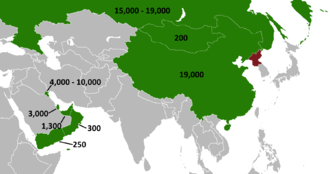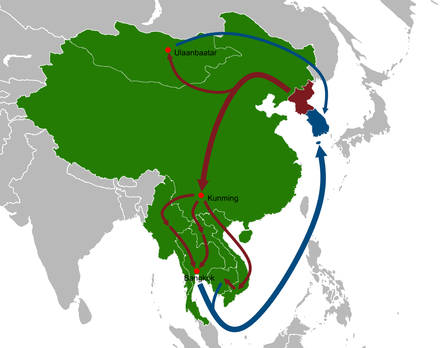Koreans in Mongolia
Koreans in Mongolia form one of the Korean diaspora communities in Asia. They consist of both North and South Korean expatriates.
| Total population | |
|---|---|
| 2,284 South Koreans (2013)[1] 200 North Koreans (2008)[2] Plus an unknown number of North Korean defectors | |
| Regions with significant populations | |
| Ulaanbaatar | |
| Languages | |
| Korean, Mongolian[3] | |
| Related ethnic groups | |
| Korean diaspora |
South Koreans
Population and business activities
In 1994, there were estimated to be around 100 South Korean expatriates in Mongolia.[4] Official statistics from South Korea's Ministry of Foreign Affairs and Trade showed 270 of their nationals in Mongolia in 1997, and about eight times as many by 2013.[1][5] Some unofficial estimates suggest that their population might be as large as 3,500 individuals.[6] Aside from residents, the number of South Korean tourists has also shown an upward trend, reaching 40,000 individuals in 2007.[7]
Many South Korean expatriates operate small businesses; the number of businesses in Mongolia funded by South Korean capital was estimated at 1,500 as of 2008.[6] The various types of businesses include restaurants serving Korean cuisine, karaoke bars, and even eyeglass shops.[4][7][8] A weekend language and culture school for Korean children was set up in 1998 by a local Korean church.[9] Under a bilateral agreement, both South Koreans working in Mongolia as well as Mongolians working in South Korea are exempted from otherwise-mandatory contributions to the national pension plans of the country they reside in.[10]
Ethnic tensions
The growth of the South Korean presence has caused some tensions with their Mongolian hosts. In 2005, Korean-owned businesses in Ulaanbaatar which displayed hangul signs were ordered to switch them to English or Mongolian only, a situation which South Korean news agency YTN attributed to growing Mongolian nationalism.[11]
Among the numerous South Korean owned businesses are a number of karaoke bars operating as fronts for prostitution, which are frequented by clients of South Korean-run businesses in Mongolia (growing from just one in 2002 to an estimated fifty as of 2005).
North Koreans
Migrant workers

As of May 2008, roughly 200 North Korean citizens worked in Mongolia.[2] In February 2008, Ulaanbaatar and Pyongyang reached an agreement which would allow as many as 5,300 North Korean workers to come to Mongolia over the following five years.[12] The relevant agreement came before the State Great Hural for approval in May that year.[2] An open letter from American NGO Human Rights Watch in August called on Mongolian Minister of Social Welfare and Labor Damdiny Demberel to ensure that the workers' freedom of expression, movement, and association would be respected; North Korean workers in similar positions in Europe were often denied such rights by their North Korean government minders.[12] The South Korean ambassador described Mongolia's decision to import North Korean workers as "problematic".[13]
Defectors

As of 2006, it was estimated that 500 North Korean defectors entered Mongolia each month, largely by way of neighbouring China.[14]
As early as 2004, some South Korean citizens' groups had begun laying plans to construct camps in Mongolia to house North Korean refugees; however, they were denied permission by the Mongolian government.[15] In September 2005, South Korean NGO Rainbow Foundation stated that they had been granted 1.3 square kilometres of land near Ulaanbaatar, and would soon begin construction on a centre which could house as many as 200 North Korean refugees [16] However, during his November 2006 trip to Beijing, Mongolian prime minister Miyeegombyn Enkhbold denied reports that his country was planning to set up any refugee camps for North Koreans, though he reaffirmed that they would be treated in a humanitarian manner.[14] In October 2008, South Korean president Lee Myung-bak was reported to have ordered his officials to look further into the possibility of setting up a camp for them in Mongolia.[17]
The Mongolian government does have facilities to provide shelter for North Korean refugees on their territory; in December 2007, Vitit Muntarbhorn, the United Nations Special Rapporteur on Human Rights in North Korea, praised Mongolia's treatment of North Korean refugees in an official report, noting that they had made commendable progress in improving such facilities since his previous visit.[18]
Both the Mongolian and South Korean governments' policies towards refugees have shifted several times. In June 2007, Mongolia began to turn North Korean refugees away from their borders, reportedly with the aim of improving their diplomatic relations with North Korea.[19] Similarly, in October 2007, the South Korean side was reported to be "closing the door" to North Korean refugees in Mongolia and Southeast Asia; North Korea watcher Andrei Lankov, a professor at Seoul's Kookmin University, attributed this to a deliberate policy by the South Korean government to minimise the number of new refugees.[20]
See also
References
- 남아시아태평양, 《재외동포현황》, Ministry of Foreign Affairs and Trade, 2013-09-30, p. 103, retrieved 2015-04-30
- "Parliament considers law to expand North Korean employment in Mongolia", Mongolia Web, 2008-05-12, archived from the original on 2012-08-20, retrieved 2009-01-27
- Brooke, James (2003-10-12), "Mongolians and Koreans: Twins With Minimal Sibling Rivalry", The New York Times, retrieved 2009-01-27
- Gang, Guk-jin (2003-08-28), '몽골에서 안경점 하는 한인도 있습니다' [In Mongolia, there are even Koreans running eyeglasses shops], Dongpo News (in Korean), retrieved 2009-01-27
- 재외동포현황 - 아시아 [Status of overseas compatriots - Asia] (in Korean), Overseas Korean Foundation, 2005, archived from the original on 2006-02-12, retrieved 2009-01-28
- 유혈 사태, 평온 회복 중, YTN News (in Korean), 2008-07-05, retrieved 2009-01-27
- "In Mongolia, sex tourism by S. Korean males leads to anti-Korean sentiment: With Korean men contributing to growth of industry, the damage to Korea's image has increased", The Hankyoreh, 2008-07-15, archived from the original on 2008-08-01, retrieved 2009-01-28
- U, Gil (2003-01-09), 몽골 상류층 사로잡은 ‘한국의 맛’ [The 'Korean flavour' captivating Mongolian high society], Weekly Dong-A (in Korean) (368), pp. 57–58, retrieved 2009-01-28
- 몽골선교사자녀학교 [Ulaanbaatar MK School] (in Korean), archived from the original on 2005-04-06, retrieved 2009-05-15
- "South Korean president in Mongolia", The Mongol Messenger, 2006-05-18, archived from the original on 2008-12-08, retrieved 2009-01-27
- 몽골에 부는 민족주의 바람 [The wind of ethnonationalism blowing in Mongolia], YTN News (in Korean), 2005-12-29, retrieved 2009-01-27
- "Mongolia: Protect Rights of North Korean Migrant Workers", Human Rights Watch, 2008-08-19, retrieved 2009-01-27
- "BCM Mongolia Meeting: Peter Morrow Hands Over Chair", Mongolia Web, 2008-07-04, retrieved 2009-01-27
- "Mongolia not planning camps for N. Koreans", Gulf Times, Qatar, 2006-11-24, archived from the original on 2007-09-30, retrieved 2009-01-27
- 몽골, 탈북자 정착촌건립 허용 못한다고 [Mongolia cannot give permission to set up camps for North Korean defectors], Radio Free Asia (in Korean), 2004-11-09, retrieved 2009-01-27
- "Center Offers Haven For North Korean Defectors in Mongolia", Radio Free Asia, 2005-09-06, archived from the original on 2006-10-03, retrieved 2009-01-27
- "Report: Mongolia could host North Korean refugee camp", Mongolia Web, 2008-10-02, archived from the original on 2012-08-20, retrieved 2009-01-27
- "Mongolia praised for improved treatment of North Korean refugees", Mongolia Web, 2007-12-25, archived from the original on 2012-08-20, retrieved 2009-01-27
- "Mongolia closes border to fleeing North Koreans", Mongolia Web, 2007-06-06, archived from the original on 2012-08-20, retrieved 2009-01-27
- "North Koreans may find door shut to South Korea", Mongolia Web, 2007-10-02, archived from the original on 2012-08-20, retrieved 2009-01-27
External links
- Monggol Gyomin Sinmun, a Korean-language news site aimed at South Korean expatriates in Mongolia
